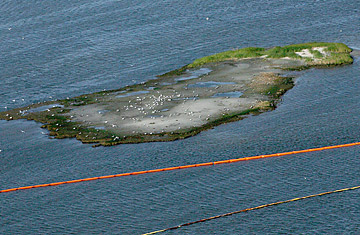
Oil booms protect a small island occupied by birds along Port East in the Gulf of Mexico, south of Louisiana, where oil leaking from the Deepwater Horizon wellhead continued to spread on April 29, 2010.
It may be time to stop referring to the Deepwater Horizon rig accident in the Gulf of Mexico as an oil spill. A spill sounds like something temporary, a glass of milk overturned, which empties and then can be cleaned up. But what is unfolding in the Gulf of Mexico, not far from the sensitive shorelines of Louisiana, Alabama, Mississippi and Florida, isn't a spill. It's an unchecked gush of crude oil from beneath the bottom of the ocean into the water — and no one can say for sure when it will finally stop.
That was the sense of experts and politicians alike as the battle against the Deepwater Horizon catastrophe entered a new and more intense stage. By early Friday morning, April 30, officials had received the first reports of oil reaching the southern shores of Louisiana, and scientists in Fort Jackson were already treating the first of many oiled birds. BP, the energy company that leased the oil rig — and which, as many politicians emphasized Friday, is financially responsible for the accident — continues to estimate that about 5,000 bbl. of oil are leaking daily from the wreck. But the Mobile Press-Register reported Friday that a confidential federal report dated April 28 estimates oil could be leaking at a rate up to 10 times greater. "We need to take every measure we can to protect our coastlines, our wildlife and our people," said Louisiana Governor Bobby Jindal in a press conference Friday afternoon.
Jindal was one of several government officials who turned up the criticism on BP, which is spending at least $7 million a day to stop the oil flow and control the spill. The governor questioned whether the hundreds of miles of booms put in place would be sufficient to protect the shoreline from incoming oil. "I do have concerns" about BP, Jindal said while sidestepping questions about potential lawsuits against the energy company.
The situation has gotten so bad that President Obama will visit the area on Sunday. On Friday, Ken Salazar — one of three Cabinet-level officials who arrived in Louisiana to help coordinate the federal response — called on BP to "work harder, faster and smarter to get the job done," while Environmental Protection Agency Administrator Lisa Jackson announced that the agency would begin monitoring the region's air and water quality. "We continue to urge BP to leverage additional assets to help lead the response in this effort," said Homeland Security Secretary Janet Napolitano. "It is clear, after several unsuccessful attempts to secure the source of the leak, it is time for BP to supplement their current mobilization." And documents emerged that showed BP had previously downplayed the possibility of a major spill.
Clearly something has to change, because nearly everything BP has tried to do to stanch the flow of oil has fallen short. Efforts to use underwater robots to activate a blowout preventer on the ocean floor that would seal the well have failed repeatedly, while work to conduct an in situ burning of the oil on the water surface — somewhat successful yesterday — had to be curtailed because of bad weather. The company is set to begin using chemical dispersants on the oil underwater, which has never been tried before, and is about to begin drilling a relief well that could eventually plug the gushing well.
But nothing is likely to fix the situation within weeks. It took responders 10 weeks to stop a similar broken well off the western coast of Australia in 2009. "This is the application of new technology," said Doug Suttle, BP's chief operating officer. "Like everyone involved, we're trying to bring this event to a close as quickly as possible and address the impact as soon as possible."
But with the oil making landfall in Louisiana — and set to reach the Mississippi, Alabama and Florida coasts by Monday — the impact is already being felt. Louisiana fishermen in Venice docked their boats this afternoon, knowing waters could be closed for a long, long time. Lawsuits have already been filed by seafood companies against BP and Transocean, the rig's operator. Analysts estimate that the Louisiana fishing industry could sustain $2.5 billion in losses, while Florida could lose $3 billion in tourism income.
BP CEO Tony Hayward said in an interview with Reuters that the company would compensate those affected by the spill, but the cost could be $8 billion or more — and the company's stock price has already dipped 12%. And the cost to the Gulf's ecosystems could be unimaginable. "Our thirst for fossil fuel means we've been playing Russian roulette with our environment," said Ken Rosenberg, director of conservation science at the Cornell Lab of Ornithology. "The gun just went off."
In response, President Barack Obama put a freeze on new offshore-drilling leases until a review of the accident could be carried out. But he declined to back away from the pursuit of offshore drilling. "I continue to believe that domestic oil production is an important part of our overall strategy for energy security," Obama said on Friday. He went on to remind reporters that BP was ultimately responsible for paying for the cleanup but that "we are fully prepared to meet our responsibilities to any and all affected communities." As the accident goes from a spill to something far worse, it may be BP paying the check, but ultimately the buck will stop in the White House, and Obama will be judged.
The Associated Press contributed to this report.
